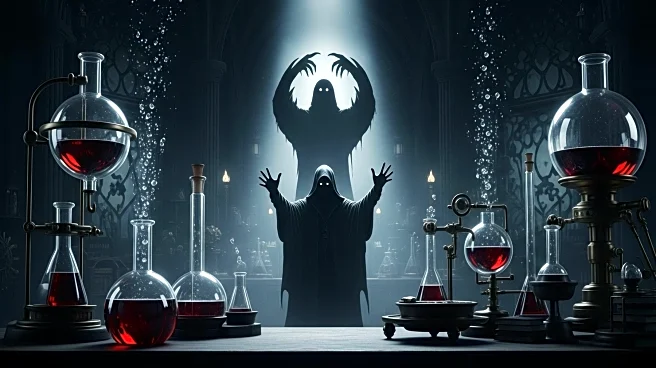What's Happening?
Guillermo Del Toro's adaptation of Mary Shelley's 'Frankenstein' premiered at the Venice Film Festival, featuring Oscar Isaac as Dr. Victor Frankenstein and Jacob Elordi as the creature. Del Toro emphasized the importance of storytelling on two fronts: the size of the screen and the size of the ideas. He expressed his desire to reclaim the scale of ideas and ambition in filmmaking. The film, backed by Netflix, aims to reach over 300 million viewers, transforming the cinematic experience. Del Toro shared his lifelong fascination with the Frankenstein story, viewing it as a personal belief system. The film also stars Mia Goth, Felix Kammerer, Lars Mikkelsen, and others.
Why It's Important?
Del Toro's 'Frankenstein' represents a significant cultural and artistic endeavor, highlighting the ongoing dialogue between traditional cinema and streaming platforms. By focusing on the scale of ideas, Del Toro challenges the industry to prioritize creative ambition over commercial constraints. The film's exploration of human imperfection and the impact of technology resonates with contemporary societal issues, offering a reflection on humanity's struggle to remain human amidst technological advancements. This adaptation could influence future cinematic projects, encouraging filmmakers to balance artistic integrity with audience reach.
What's Next?
Following its Venice debut, 'Frankenstein' will have a limited theatrical run before streaming on Netflix. The film's reception may impact future collaborations between filmmakers and streaming services, potentially setting a precedent for how high-budget films are distributed. Stakeholders in the film industry, including directors, producers, and streaming platforms, will likely monitor the film's performance to gauge audience interest in large-scale, idea-driven projects. Del Toro's approach may inspire other filmmakers to pursue ambitious storytelling, fostering a new era of cinematic creativity.
Beyond the Headlines
Del Toro's adaptation of 'Frankenstein' delves into deeper themes of human imperfection and the ethical implications of technological advancements. The film prompts viewers to consider the essence of humanity and the importance of preserving one's soul in a rapidly changing world. By addressing the dangers of artificial intelligence and natural stupidity, Del Toro encourages a broader conversation about the role of technology in society. This narrative may influence cultural perceptions of technology and inspire discussions on ethical considerations in scientific progress.








